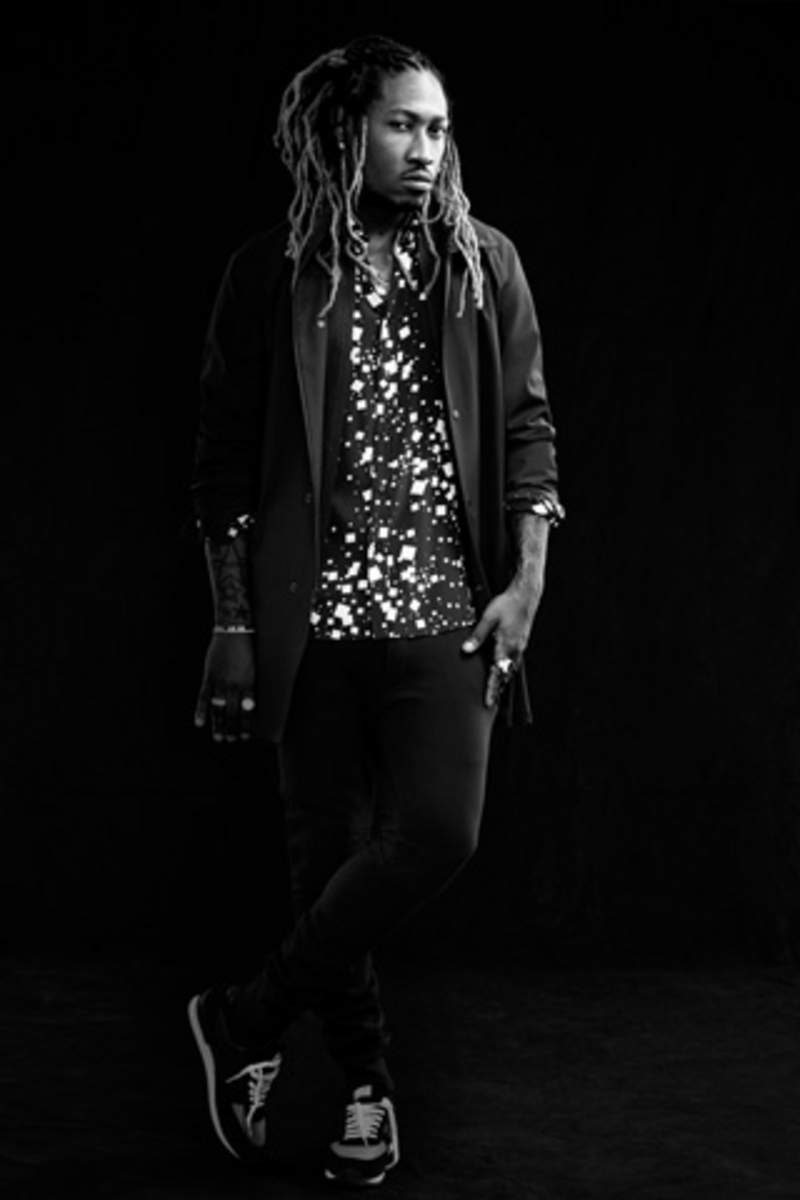THE JOURNAL

The hip-hop star talks about his latest album, which features Mr Kanye West, Drake and Andre 3000, plus his journey from the backstreets of Atlanta to fashion’s front row.
If the eternal question is “Which comes first, the music or the lyrics?”, for the rapper known as Future, the answer is clear. “At school, I was always interested in poems,” he says. “I just loved the way you could express yourself and how you could say just a few words to mean a lot. That’s why I used to love my reading class so much; I’d pay so much attention to the way words rhyme. I knew from the beginning that the first time I heard Shakespeare, it felt right to me.”
It’s a surprisingly academic response from the man born Mr Nayvadius Wilburn in Atlanta’s impoverished, crime-ridden Kirkwood neighbourhood. But Future has demonstrated a constant eagerness to surprise, from the way he puts out his music (in 2013 alone, he released two mix tapes and contributed guest verses to more than 40 songs) to the sound and style of his delivery, which alternates between explosive, rapid-fire bursts and spacey, elongated singing. In a review of his recent album, Honest, Rolling Stone wrote that “lots of rappers talk about drugs, but Future is one of the few whose music makes you feel like you’re actually on some”.


Yet this unlikely approach has made him one of hip-hop’s latest breakout stars. Honest entered the charts at No.2 (ahead of Iggy Azalea, and trailing only the juggernaut that is the parent-torturing Frozen soundtrack). The album features appearances by Mr Kanye West, Drake, and Outkast’s André 3000; meanwhile, Future has turned up on tracks by everyone from Ms Miley Cyrus to Lil’ Wayne, from Mr Justin Bieber to Rihanna.
“Everyone I come into contact with, different or similar, I took something for the good,” he says. “Sometimes it’s just watching how somebody moves, but I took something and applied it to myself to make me a better person.”


On this hot summer afternoon, Future, age 30, is taking a few minutes to relax in a photo studio high above Times Square – sprawled on a sofa, shoes off and stocking feet propped on a coffee table – before sprinting off to watch Ms Serena Williams win her semi-final match at the US Open. He maintains that the shoot he just completed isn’t just a promotional obligation, but another creative outlet.
“I’ve been interested in fashion since I was born,” says Future, who oversees his own Freebandz Apparel line and attended Calvin Klein’s Milan show earlier this year with his on-and-off girlfriend, R & B singer Ciara. “Fashion is fun. You get a chance to express yourself with photos, finding ways to connect with the camera, learn more about different angles and poses. It’s like making a hit record – you want to make a hit when you do these photoshoots.”

“I knew from the beginning that the first time I heard Shakespeare, it felt right to me”
Future started rapping as a teenager – his cousin, Mr Rico Wade, was part of the Organized Noize production team that worked with Outkast, Goodie Mob and other Atlanta-based artists – but then fell back into the street life. Around 2010, he decided to commit to his music full-time. More recently, he demonstrated his dedication to his creative vision when, after announcing that he would be following his 2012 debut album, Pluto, with a record titled Future Hendrix (paying tribute to the creative independence of Mr Jimi Hendrix), he abruptly stopped work on the project and shifted to the songs that would become Honest.
“I did a U-turn,” he says. “The music wasn’t connecting to my soul. I felt as if I was making great music, but it was someone else’s story. So halfway through the album I was like, ‘Man, I love the direction this is going, but let me go back to where I was and see how I got here.’ It’s like I was on my GPS and when it might take you all the way around, I saw that I could just take a left. So I needed to go back and go with my instinct, my gut feeling, my common sense.”


The wild, sprawling results swing from the blistering posse cut “Move That Dope” to the contemplative “Blood, Sweat, Tears,” on which Future raps “Everybody want a piece of me/ Everybody wants a piece of fame/ I wish you could feel all my mama’s pain.”
“That’s one of the most important records on the album,” says Future, who claims that BB King’s blues is the first music he remembers hearing. “I felt as if that was everything I went through to make the album, to get to where I was at that time, and continue to build, to grow as a human being, as a father, as a man, learning from my mistakes.”

Like such titans as The Notorious B.I.G. and Jay-Z, though, Future doesn’t write down his rhymes, instead creating his never-ending flow of lyrics spontaneously in the studio. “Sometimes when you write it down, it’s too clichéd,” he says. “So I keep it in my memory. I download my information, and then my creativity can flow out of me when I hear a beat.
“Every moment you’ve got to enjoy, but at the same time it’s like a diary,” he continues. “I could take something from this interview and be able to create around it. As a writer, you take moments and sounds, people moving in the background, all the details. Go in depth so that people can actually see how I’m sitting right here, right now.” Future pauses, and begins to sketch out how he would tell that story. “With my feet up on the table, laying back on a leather couch, eating an apple, with Alexander Wang on – that’s art. I could have painted with a brush, but I just spoke it to you.”